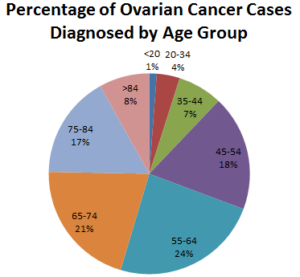
Ovarian cancer is one of the deadliest cancers because it’s usually not discovered until it has spread.
A CT scan is sometimes taken in women who have symptoms suspicious for ovarian cancer.
But does this mean that a CT scan is a reliable tool for detecting this stealthy killer?
“There is no screening test for ovarian cancer,” says Robin Cohen, former oncology RN and currently the CEO and co-founder of the Sandy Rollman Ovarian Cancer Foundation.
“A CT scan, MRI or ultrasound can diagnose ovarian cancer in advanced stages once a mass is large enough to see on a radiographic test. The most effective way to diagnose ovarian cancer is through surgery.”
An image doesn’t confirm malignancy. The mass has to be removed surgically and then sent to a pathology lab for a biopsy before an official diagnosis is made.
What also needs to be considered is the unacceptably high false positive rate that an MRI and ultrasound yield.
A false positive is when a mass has features indicative of malignancy—and the patient then faces weeks or months of profound anxiety over further tests, waiting, scheduling surgery and then undergoing surgery – and the biopsy turns out negative.
Unfortunately, our medical technology isn’t advanced enough to avoid these mishaps.
And a sure-fire non-invasive way of confirming ovarian cancer isn’t exactly on the horizon, either.
Cohen also explains, “A CT scan should not be used as a stand-alone method to rule out ovarian cancer as a possible reason for symptoms, but coupled with the CA-125 blood test it can add to the bigger picture and lead to a diagnosis.”
So though a doctor may strongly suspect ovarian cancer based on CT scan and CA-125 results, and thus want to move ahead with a surgical excision, the actual diagnosis is made by the pathologist after viewing the excised tissue’s cells under a microscope.

Keilana CC


























